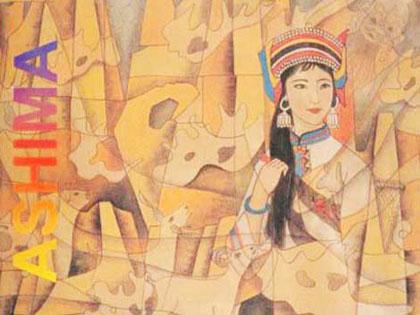Ashima of Yi
2009-08-11 10:51 BJT
Ashima is spread in the Yi Autonomous County in Shilin of Yunnan Province. It is a long narrative poem of the Sani people who are a tributary of the Yi ethnic group. Generations after generations of the Sani people narrate or sing the story of Ashima with oral poem language.
 |
| Ashima is a long narrative poem of the Sani people who are a tributary of the Yi ethnic group. |
The story goes like this: Ashima, a clever, kind, beautiful and diligent farmhouse girl falls in love with a brave and good-natured sheepherder who is called Ahei. Azhi, the son of a headman also admires Ashima, but was resolutely refused by the latter. Then, Azhi sent someone to compel Ashima into marriage with him, however, again refused firmly. So Azhi sent some people to rob Ashima when Ahei was away from home. Later, Ahei heard of the news and rushed home and saved Ashima. Azhi proposed to hold a song competition with Ahei, thereby, determines who the winner is. The result turns out that Azhi failed out. But he was still not willing to admit the failure. Taking advantage of the chance when Ashima and Ahei were resting by the side of a stream, he raised the floodgate and drowned Ashima. Ahei sadly called the name of Ashima, but she had become a lofty stone statue. Now, the legend has become a part of the daily life, wedding and funeral ceremonies and other customs of the Sani people, thus, sang from generation to generation among the people.
The long poem Ashima adopts romantic poetic technique and rich figures of speech to highlight the kindness and beauty, wisdom and power, diligence and braveness of the character. It is affectionately called by the Sani people as "the song of our ethics", and Ashima even becomes the antonomasia of the women of the Yi ethics. It demonstrates the human ideal that light will final substitute darkness, and kindness and beauty will eventually triumph over infamy. It reflects the national character and spirit of pursuing freedom of the Sani people of the Yi ethnics. At present, the story of Ashima has been translated into more than 20 languages and issued at home and abroad. In addition, the story was adopted and shot into Ashima, the first color film of the People's Republic of China.
Editor: Zhang Wen | Source: Cultural China
 Mail
Mail Share
Share Print
Print


 Video
Video









 2009 China Central Television. All Rights Reserved
2009 China Central Television. All Rights Reserved